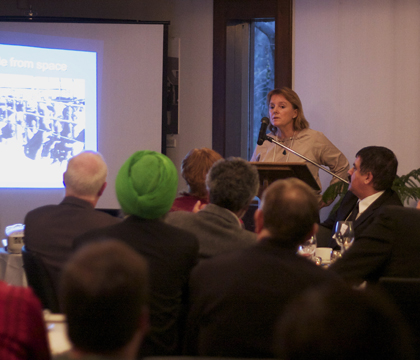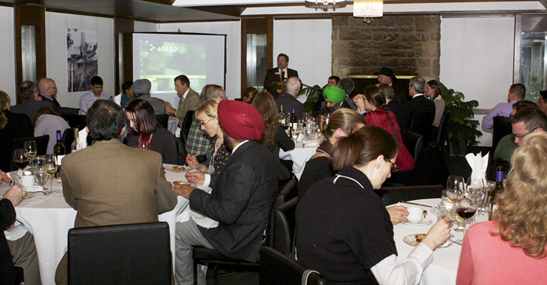
Special dinner puts One Health first
One Health was the number one dinner topic at a unique University of Saskatchewan event on May 2 that brought together more than 50 representatives of research, industry and government in Western Canada.
By Myrna MacDonald
The special dinner gave a select group of researchers from the Western College of Veterinary Medicine and the U of S the opportunity to talk about their research and exchange ideas with a variety of people.
Welcomed by WCVM Dean Dr. Douglas Freeman, the event's invitees included men and women who are involved in everything from agriculture, public health, food safety and disease surveillance to product development, international trade and public policy.
Select special guests included Dr. Moira McKinnon of Saskatchewan's Ministry of Health, Dr. Frank Nolan of the Natural Sciences and Engineering Research Council of Canada (NSERC), Dr. Richard Harland (WCVM '82) of Novartis Health Canada, Dr. Laura Saward of Cangene Corporation and Dr. Jaspinder Komal of Agriculture and Agri-Food Canada.
This is the second dinner organized by the WCVM's Research Office in partnership with NSERC (Prairies regional office). While food safety was the event's focus in 2011, organizers targeted One Health for this year's dinner.
As several of the evening's speakers remarked, now is the ideal time to talk about One Health — a global initiative that encourages interdisciplinary collaboration and communication among health professionals in all aspects of health care for humans, animals and the environment.
In McKinnon's keynote presentation, the chief medical health officer of Saskatchewan listed emerging zoonotic diseases around the globe such as Australia's Hendra virus that's harboured by flying foxes (pteropid fruit bats) and North America's Lyme disease that's spread through the bite of blacklegged ticks.
Both examples highlight the need for collaborative expertise to manage these health challenges. The U of S is responding to that demand and is being recognized for their efforts internationally, says McKinnon, who pointed out that one of her international colleagues recently attended a conference presentation on One Health that was given by a U of S representative.
"One Health is being championed by the U of S so that's a real feather in your cap."

In the past decade, One Health has gained real momentum on the U of S campus. Besides being one of the university's signature research areas, the U of S Council of Health Science Deans is playing a leadership role in encouraging collaborative programs among health science colleges and schools.
A concrete example of their work is the new U of S Health Sciences infrastructure project that will bring together faculty, students and staff from a number of health science colleges for education, research and planning.
One Health is also the driving force between the development of new training initiatives that integrate various disciplines and skills. Once funding is secured, these new programs will ensure that graduates are more equipped to deal with multi-faceted issues such as emerging zoonotic diseases (diseases that are transmissible between humans and animals), vaccine development and food security and safety, reported Dr. Bruce Reeder, chair of the CHSD's One Health Initiative.
The key factor is integration, emphasized Dr. Hugh Townsend, an infectious disease specialist at the WCVM's Department of Large Animal Clinical Sciences.
"Collaborative research is valuable, but we now need to concentrate on integrated research — we have to take it to the next level," said Townsend, who is also a researcher at the Vaccine and Infectious Disease Organization-International Vaccine Centre (VIDO-InterVac). "It's important for us to understand what we're doing and how it's relative to the people upstream."
Dr. Baljit Singh, WCVM's associate dean of research, agreed with Townsend's emphasis on integration and added international partnerships — including exchange programs — as another key requirement to advancing the university's One Health initiatives.
To illustrate his point, Singh introduced three visiting scientists who had just arrived from India earlier in the day. Their visit is part of a U of S international partnership project on environmental toxicology and public health that was developed by the WCVM in co-operation with the Guru Angad Dev Veterinary and Animal Sciences University (GADVASU) in Punjab, India.
Welcomed by WCVM Dean Dr. Douglas Freeman, the event's invitees included men and women who are involved in everything from agriculture, public health, food safety and disease surveillance to product development, international trade and public policy.
Select special guests included Dr. Moira McKinnon of Saskatchewan's Ministry of Health, Dr. Frank Nolan of the Natural Sciences and Engineering Research Council of Canada (NSERC), Dr. Richard Harland (WCVM '82) of Novartis Health Canada, Dr. Laura Saward of Cangene Corporation and Dr. Jaspinder Komal of Agriculture and Agri-Food Canada.
This is the second dinner organized by the WCVM's Research Office in partnership with NSERC (Prairies regional office). While food safety was the event's focus in 2011, organizers targeted One Health for this year's dinner.
As several of the evening's speakers remarked, now is the ideal time to talk about One Health — a global initiative that encourages interdisciplinary collaboration and communication among health professionals in all aspects of health care for humans, animals and the environment.
In McKinnon's keynote presentation, the chief medical health officer of Saskatchewan listed emerging zoonotic diseases around the globe such as Australia's Hendra virus that's harboured by flying foxes (pteropid fruit bats) and North America's Lyme disease that's spread through the bite of blacklegged ticks.
Both examples highlight the need for collaborative expertise to manage these health challenges. The U of S is responding to that demand and is being recognized for their efforts internationally, says McKinnon, who pointed out that one of her international colleagues recently attended a conference presentation on One Health that was given by a U of S representative.
"One Health is being championed by the U of S so that's a real feather in your cap."

In the past decade, One Health has gained real momentum on the U of S campus. Besides being one of the university's signature research areas, the U of S Council of Health Science Deans is playing a leadership role in encouraging collaborative programs among health science colleges and schools.
A concrete example of their work is the new U of S Health Sciences infrastructure project that will bring together faculty, students and staff from a number of health science colleges for education, research and planning.
One Health is also the driving force between the development of new training initiatives that integrate various disciplines and skills. Once funding is secured, these new programs will ensure that graduates are more equipped to deal with multi-faceted issues such as emerging zoonotic diseases (diseases that are transmissible between humans and animals), vaccine development and food security and safety, reported Dr. Bruce Reeder, chair of the CHSD's One Health Initiative.
The key factor is integration, emphasized Dr. Hugh Townsend, an infectious disease specialist at the WCVM's Department of Large Animal Clinical Sciences.
"Collaborative research is valuable, but we now need to concentrate on integrated research — we have to take it to the next level," said Townsend, who is also a researcher at the Vaccine and Infectious Disease Organization-International Vaccine Centre (VIDO-InterVac). "It's important for us to understand what we're doing and how it's relative to the people upstream."
Dr. Baljit Singh, WCVM's associate dean of research, agreed with Townsend's emphasis on integration and added international partnerships — including exchange programs — as another key requirement to advancing the university's One Health initiatives.
To illustrate his point, Singh introduced three visiting scientists who had just arrived from India earlier in the day. Their visit is part of a U of S international partnership project on environmental toxicology and public health that was developed by the WCVM in co-operation with the Guru Angad Dev Veterinary and Animal Sciences University (GADVASU) in Punjab, India.
